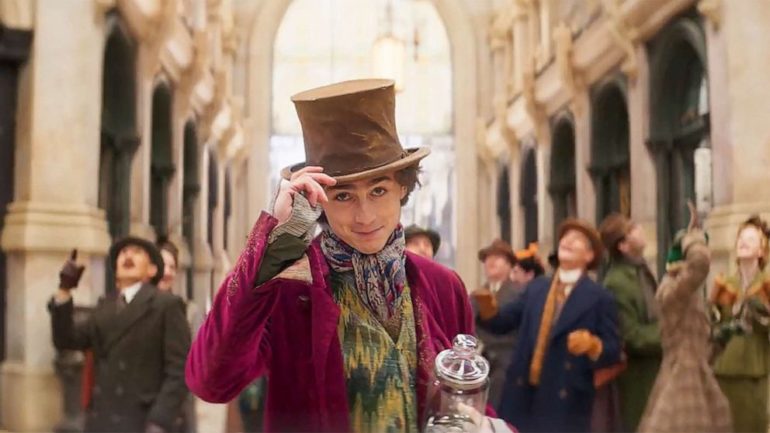In the opening scene of Wonka, Willy Wonka (Timothée Chalamet) arrives in an unnamed town in an unspecified year, and hops off his boat with a spring in his step and a dream in his heart, namely to set up shop in a renowned galerie of chocolatiers and make his fortune. He skips along with a pep in his step and a knack for illusions and tricks. Walking behind the credits floating onscreen, this new Wonka feels more like a magician than a candyman, and is lighter and more approachable than any version of the character we’ve seen before. Then we have to remember that this is supposed to be a prequel to Gene Wilder’s interpretation of Wonka, and we’re in trouble.
Willy Wonka and the Chocolate Factory came to cinema screens in 1971, eventually became a beloved adaptation of a very popular children’s novel, and has now settled into a well-worn place as a fixture of Christmas television schedules. Between the time elapsed since its release, and the ongoing power of its own inherent likability, there’s little about Mel Stuart’s visibly-aged but endearing film that demands further explanation. Too bad; we’ve now got this origin story. Structurally, Wonka has all the pieces in place to claim to be a worthy successor to the previous film’s charms, but this artificial-tasting confection lacks the sour undertones that make its predecessor so memorable. Where the original film located the whimsy of Willy Wonka’s chocolate factory in an the identifiable reality of Charlie Bucket’s life, this new Wonka lacks a similar anchor. After attempting to sell chocolate on the street (all while singing an upbeat ditty, naturally), Wonka is fined and now penniless. Yet even when faced with sleeping rough in the cold, there’s never any sense of poor Willy being in any kind of danger. This version of the character is so chipper, he’s practically bulletproof.
Wonka lacks the confidence to be as mean as its predecessor. As with other Roald Dahl properties, the source novel Charlie and the Chocolate Factory delivered its messages with a side helping of snide meanness that didn’t pander to children. They appreciated its frankness about how cruel the world could be, and this was epitomised in the film by Wilder’s mischievous and mysterious performance. What little sourness there is in Wonka feels filtered, lacking in real bite. Wonka himself gets a hint of a sob backstory (Cue Sally Hawkins in flashbacks as Momma Wonka), but the main thrust of the story belongs to Noodle (Calah Lane). By prioritising this orphaned urchin’s story above Wonka’s, the film forgets who it’s really about, and reminds us why Wonka was always best placed to be a supporting character. He’s too whimsical to be threatened or to invite much audience empathy. As Wonka, Chalemet is adequate, but he’d be better served by a darker script. Wonka is very much of a piece with the previous films of co-writer/director Paul King, namely Paddington and its sequel. Chirpy positivity is the order of the day, even in the face of multiple antagonists.
Noodle and the indebted Wonka are in the employ/possession of hotel hostess Mrs. Scrubbit. As the battle-axe Scrubbit, Olivia Colman has fun with her exaggerated features and a maze of a hotel to lord over, but her character is just one of many elements that feel OTT compared to the previous Willy Wonka. Three rival chocolatiers (Paterson Joseph’s Slugworth, Matthew Baynton’s Fickelgruber and Matt Lucas as Prodnose) will see Wonka gone by any means necessary, but they never feel like a major threat, even with Joseph’s scene-stealing turn. He and fellow Peep Show alum Colman are the highlights of Wonka because they give the film what little edge it has. The new songs (by Divine Comedy frontman Neil Hannon) are largely immemorable, the other supporting cast members (Rowan Atkinson, Keegan-Michael Key, Jim Carter, etc.) come and go, and we can guess exactly how all this will end. Hugh Grant is hilariously snippy as an Oompa Loompa, but there’s just not enough of that aggression to go around. The casts’ blend of English and American accents, and the lack of effort to locate this endeavour in a recognisable setting, lend Wonka the hyper but false feeling of an off-Broadway musical. It’s energetic, but there’s little investment when the whole thing feels so forced and sugary. Wonka is a film determined not to rub its audience up the wrong way.

